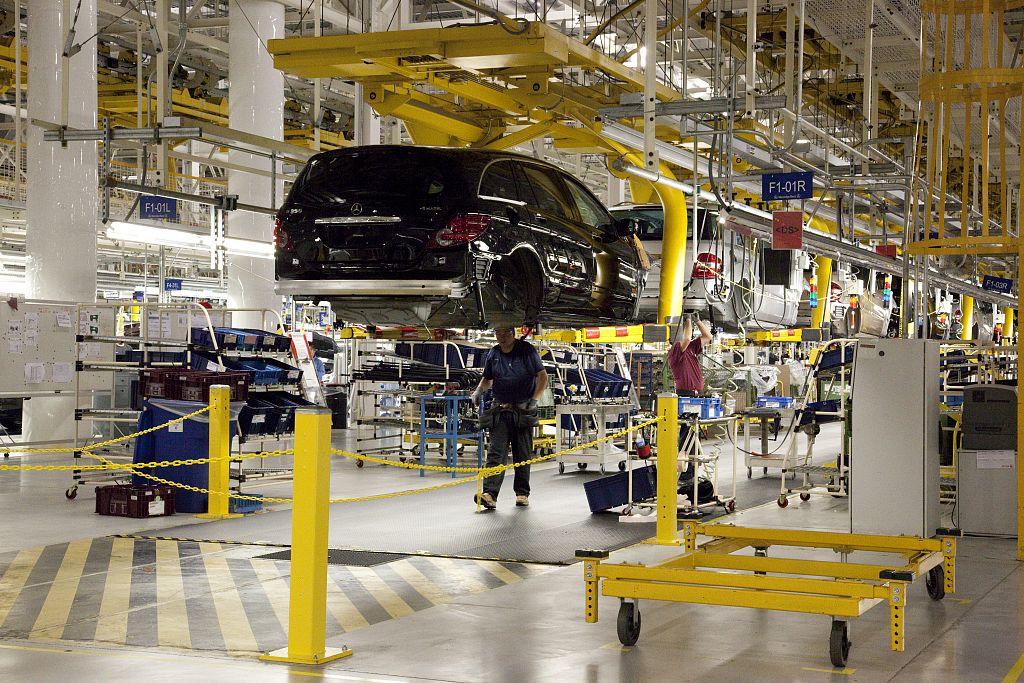
Otto Barenberg is a student at Harvard Law School and the Digital Director of OnLabor.
In today’s news and commentary, Mercedes workers gear up for a major election; Argentina’s unions stage a general strike; and the Apple organizing campaign faces a setback.
Tomorrow, workers at a Mercedes-Benz plant in Tuscaloosa County, Alabama will begin voting on whether to join the United Auto Workers (UAW). The election, which covers nearly 6,000 Mercedes employees and will run through Friday, marks a crucial test of the UAW’s path-breaking campaign to unionize Southern auto plants. The union hopes to capitalize off the momentum from its historic victory at a Volkswagen factory in Tennessee last month.
Mercedes has waged an aggressive anti-union campaign, despite its claims of neutrality. Elyse, Everest, John, and Holden previously reported on the German automaker’s captive audience meetings; employee allegations of intimidation and retaliation; and a Republican-backed anti-union media blitz. On Friday, the National Labor Relations Board (NLRB) indicated it was investigating six unfair labor practice charges at the Tuscaloosa plant. The complaints allege Mercedes disciplined workers for discussing unionization, fired union supporters, blocked workers from distributing union materials, engaged in surveillance, coerced employees into attending captive audience meetings, and told workers that unionization is “futile.” Undeterred, hundreds of pro-union workers rallied yesterday ahead of tomorrow’s vote.
Even farther south, on Thursday, Argentina’s largest unions staged a 24-hour general strike in protest of the country’s libertarian president Javier Milei. Schools, hospitals, and transportation services were closed as millions of workers challenged Milei’s drastic cuts to public spending, mass layoffs of public employees, and far-reaching deregulatory agenda. “We are facing a government that promotes the elimination of labor and social rights,” the unions said. Last week’s general strike is the second of Milei’s short tenure. Over 1.5 million workers walked off the job in January, as Holt reported at the time, pressuring the Argentine leader to backtrack on some of his most extreme austerity measures. Milei, a self-described “anarcho-capitalist,” ran on an aggressive anti-inflation platform, but has so far struggled to stabilize the country’s currency and economy. As the country’s annual inflation rate nears 300%, over 40% of Argentines are now living below the poverty line.
Back up north, workers at a New Jersey Apple store voted against joining the Communication Workers of America (CWA). The election marks the CWA’s first such defeat in its campaign to organize the tech behemoth. The union, which had previously filed NLRB complaints alleging unlawful union-busting at Apple’s New Jersey store, said in a statement: “instead of leaving the decision up to the workers themselves, the company turned to its usual anti-union playbook to influence the results of the election.”
Workers at two Apple stores voted to unionize in 2022—Oklahoma City and Towson, Maryland—but neither have reached a contract with the company. Yesterday, employees at the Towson store voted to authorize a strike over Apple’s alleged refusal to negotiate in good faith.






Daily News & Commentary
Start your day with our roundup of the latest labor developments. See all
February 27
The Ninth Circuit allows Trump to dismantle certain government unions based on national security concerns; and the DOL set to focus enforcement on firms with “outsized market power.”
February 26
Workplace AI regulations proposed in Michigan; en banc D.C. Circuit hears oral argument in CFPB case; white police officers sue Philadelphia over DEI policy.
February 25
OSHA workplace inspections significantly drop in 2025; the Court denies a petition for certiorari to review a Minnesota law banning mandatory anti-union meetings at work; and the Court declines two petitions to determine whether Air Force service members should receive backpay as a result of religious challenges to the now-revoked COVID-19 vaccine mandate.
February 24
In today’s news and commentary, the NLRB uses the Obama-era Browning-Ferris standard, a fired National Park ranger sues the Department of Interior and the National Park Service, the NLRB closes out Amazon’s labor dispute on Staten Island, and OIRA signals changes to the Biden-era independent contractor rule. The NLRB ruled that Browning-Ferris Industries jointly employed […]
February 23
In today’s news and commentary, the Trump administration proposes a rule limiting employment authorization for asylum seekers and Matt Bruenig introduces a new LLM tool analyzing employer rules under Stericycle. Law360 reports that the Trump administration proposed a rule on Friday that would change the employment authorization process for asylum seekers. Under the proposed rule, […]
February 22
A petition for certiorari in Bivens v. Zep, New York nurses end their historic six-week-strike, and Professor Block argues for just cause protections in New York City.